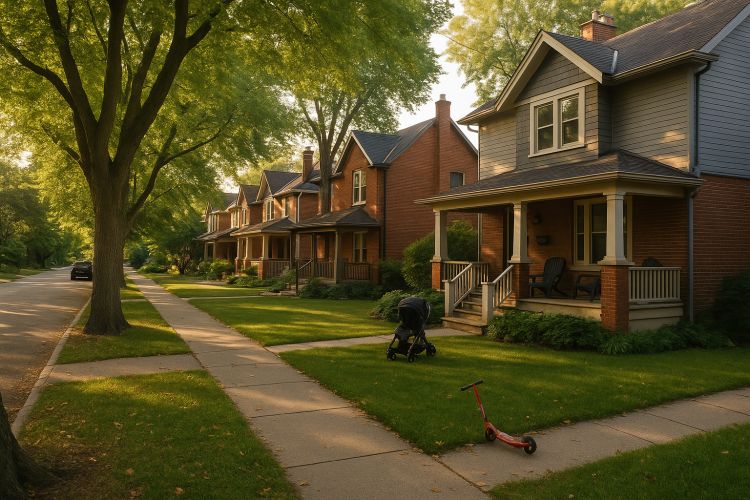If you’re wondering, “Should I sell my house now?” in fall 2025, you’re entering a balanced market where preparation matters more than timing. Learning how to sell your house in today’s Ontario real estate market—whether you’re hoping to sell your house quickly or considering selling it as-is—requires understanding current conditions and strategic positioning.
Here’s your complete roadmap addressing everything from “how to sell my house” to exploring how to sell a house by owner, covering scenarios whether you’re asking “how can I sell my house fast” or dealing with mortgage complications, with realistic expectations based on today’s conditions.
TL;DR Summary
- Ontario’s housing market is balanced—homeowners asking “is it a good time to sell a house” should focus on preparation over timing
- The complete selling process typically takes 6-12 weeks, whether you choose traditional methods or explore alternatives like selling without a realtor
- Strategic pricing matters more than obsessing over “when is the best time to sell a house?”
- Fall 2025 offers motivated buyers for properties ready to sell as-is or with improvements
- Expect 4-6% total costs—critical information for anyone wondering, “if I sell my house for $300k, how much do I get?”
Understanding Ontario’s Current Selling Landscape
Let me be honest about what you’re walking into. Ontario’s housing market has shifted dramatically from the rapid-fire sales we saw during the pandemic. We’re now in what industry experts call a “balanced market”—with a sales-to-new-listings ratio around 43%, meaning buyers have options and time to think.
What does this mean for sellers? Higher inventory levels have created a more competitive environment where your house needs to stand out, not just exist. Buyers are taking longer to decide, ask more questions, and negotiate more than they did when every property had multiple offers by day two.
The regional differences matter more now. While Toronto and Hamilton remain in balanced territory, some GTA suburbs are showing buyer-leaning conditions. Meanwhile, areas like Ottawa show more resilience, and smaller Ontario markets each have their own dynamics.
Fall 2025 presents unique opportunities. The expected spring rush never materialized this year, partly due to economic uncertainty around trade policies. Many potential sellers waited, creating pent-up inventory that’s now hitting the market. This means more competition, but also more serious buyers who’ve waited through the uncertainty.
Current economic factors include stabilizing interest rates and improved mortgage affordability compared to peak rates. However, buyers remain cautious, influenced by broader economic concerns. Understanding how the Ontario real estate market affects home prices helps set realistic expectations—whether you can sell a house with a mortgage or need quick cash solutions, your timeline will likely be longer than peak market years, but motivated buyers are actively looking.
The CMHC Housing Market Outlook provides detailed analysis of these trends for homeowners asking “Is now a good time to sell a house?” – timing varies based on personal circumstances more than seasonal patterns.
The Complete Ontario Home Selling Process
Whether you’re a first-time seller asking, “How do I sell my house fast?” or an experienced homeowner wondering, “Can I sell my house without a realtor?” understanding the complete process helps you plan effectively and avoid costly delays. Each phase has specific requirements and timelines that directly impact success.

Pre-Listing Preparation (4-6 weeks)
Start with an honest property assessment. Walk through your home like a buyer would, noting everything from squeaky hinges to outdated fixtures. This isn’t about major renovations—it’s about addressing obvious issues that could derail negotiations later.
Document gathering is non-negotiable in Ontario and represents one of the most critical documents needed to sell a house in Ontario. Whether you’re planning a quick sale or taking time for optimal presentation, you’ll need your original deed or title, property survey, previous inspection reports, warranty information for major appliances, and utility bills for the past year. If you’ve done renovations, gather permits and receipts. Missing documentation creates delays that cost money in carrying costs—particularly problematic if you’re thinking, “I want to sell my house” on a tight timeline.
Market research means more than checking similar listings. In today’s market, you need to understand what sold versus what’s still sitting and why. Look at price reductions, days on the market, and seasonal patterns in your specific neighbourhood. This data determines your pricing strategy and timeline expectations.
Consider your staging approach early. In a market with more inventory, presentation matters significantly. Whether you hire professionals or do it yourself, plan for decluttering, deep cleaning, and strategic furniture placement that makes rooms feel larger and more inviting.
Marketing and Showings (2-4 weeks)
Professional photography isn’t optional when buyers have numerous choices. Most buyers start their search online, and poor photos eliminate your property before anyone steps inside. Invest in quality images that showcase your home’s best features and capture the lifestyle buyers want.
MLS listing strategy has evolved. Your listing description needs to highlight what makes your property unique rather than generic features every house has. In a balanced market, buyers read descriptions more carefully and use them to decide which properties merit in-person visits.
Showing management requires flexibility. Unlike seller’s markets, where you could dictate terms, current conditions favour accommodating buyer schedules. Private showings often work better than open houses for serious buyers, allowing for meaningful conversations about your property’s features.
Prepare for longer showing periods. Buyers are taking more time to view properties and asking more detailed questions. Have information readily available about utilities, property taxes, neighbourhood amenities, and any upcoming developments that might affect the area.

Negotiation to Closing (4-6 weeks)
Offer evaluation looks different when buyers have leverage. Expect more conditional offers—home inspection, financing, and sale of current home conditions are common. Review each offer’s total package, not just price. A firm offer at a slightly lower price might be better than a higher conditional offer.
Negotiation in balanced markets requires patience and strategy. Buyers may request repairs, closing cost assistance, or extended closing dates. Having realistic expectations about concessions helps determine which requests to accept versus counter-offer.
The legal process in Ontario involves significant documentation. Your lawyer handles the Agreement of Purchase and Sale, arranges for mortgage discharge, prepares the Statement of Adjustments, and manages title transfer. Choose an experienced real estate lawyer who understands current market conditions and can expedite the process.
Closing day logistics include final walkthrough arrangements, key handover, and fund transfers. Your lawyer coordinates with the buyer’s lawyer to ensure smooth completion. Plan for potential delays and have backup arrangements for possession timing.
Maximizing Your Sale Value in Ontario’s Market
Strategic staging delivers measurable results even in balanced markets. Understanding top home staging tips for Ontario sellers helps focus your efforts effectively—concentrate on the three most important areas: living room, kitchen, and master bedroom. These spaces influence buyer decisions most significantly. Simple changes like neutral paint, proper lighting, and furniture arrangement can significantly impact perceived value.
Pricing psychology matters more when buyers have choices. Learning how to increase your home’s value before selling starts with realistic pricing rather than expensive renovations. Homeowners wondering, “Do you pay taxes when you sell a house?” should know that overpricing leads to extended time on the market and eventual price reductions that stigmatize your listing. Price competitively from the start, understanding that strategic pricing often generates more interest whether you’re selling as-is for cash or with improvements.
Seasonal timing optimization for fall means leveraging serious buyer motivation. Families looking to settle before the holiday season are often more committed to closing deals. Late fall buyers have usually been searching for months and know what they want—perfect timing if you want to sell your house fast for cash or through traditional methods.
Cost-effective value improvements focus on ROI. Fresh paint, professional cleaning, minor landscaping, and updated fixtures provide returns without major investment. Even homeowners thinking, “How do I sell a haunted house?” or dealing with unique property challenges should avoid expensive renovations unless their property has functional issues that prevent sale. In current market conditions, over-improvement rarely pays off whether you sell the house quickly or take a measured approach.
Common costly mistakes include refusing reasonable offers while waiting for “full price,” neglecting minor repairs that become negotiation points, and inadequate marketing that fails to attract qualified buyers. Understanding market conditions helps avoid these pitfalls.
Quick Decision Framework
Understanding the best way to sell your house depends on your experience level and circumstances. Here’s how different approaches compare for Ontario sellers:
| Approach | Timeline | Cost Range | Best For |
| DIY Sale | 8-12 weeks | Legal fees only ($1,200-1,600) | Experienced sellers learning how to sell your house by owner |
| Professional | 6-10 weeks | 3.5-5% commission + legal | First-time sellers, complex situations |
| Hybrid | 7-11 weeks | Flat fee + legal | Budget-conscious with some experience |
Whether you choose full-service help, explore options to sell your house to Zillow, or go the route of selling your house without realtor assistance, understanding how realtors calculate the selling price of a house helps you make informed pricing decisions.

Conclusion
Successfully selling your house in Ontario’s current market requires realistic expectations, thorough preparation, and strategic positioning. The days of listing and selling within a week are behind us, but motivated buyers are actively searching for well-presented, properly priced properties.
Whether you choose professional help, work with companies that buy houses for cash, or decide to sell your house independently, focus on what you can control: property condition, documentation, pricing strategy, and presentation. Work with professionals who understand current market dynamics rather than those stuck in peak market thinking.
Homeowners asking “I need to sell my house fast” or seeking quick local solutions should know that success depends more on preparation and strategy than perfect timing. Start early, price right, and present well. For those wondering about top factors that determine your home’s value in Ontario or seeking the best free online home value estimator tools in Canada, remember that accurate pricing remains the foundation of every successful sale—whether you’re following a St. Joseph prayer to sell a house tradition or using a St. Joseph statue to sell a house for good luck.






